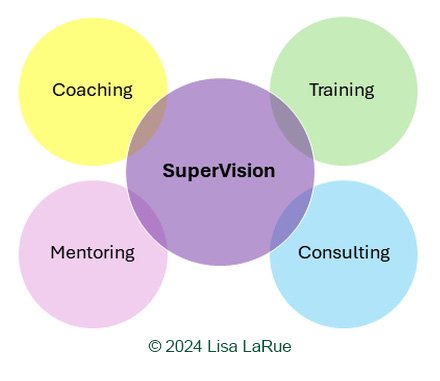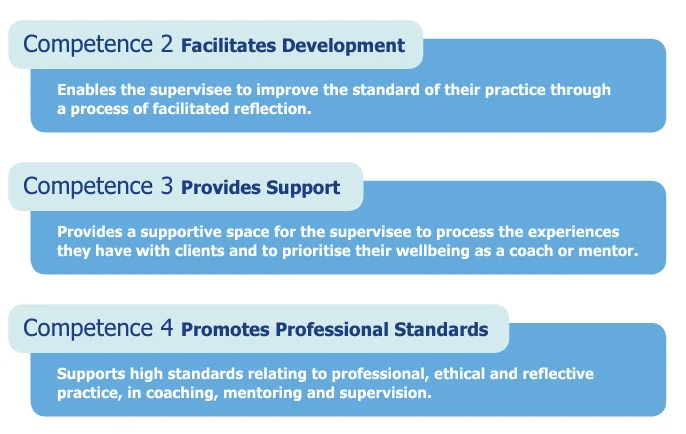Let’s start by clearing up a common misconception about supervision. When we talk about coach SuperVision, we’re not referring to a superior peering over your shoulder assessing and passing judgment on your work. It is important to understand that the word supervision has a different meaning in the context of coaching SuperVision. SuperVision in coaching is not supervising or managing someone’s coaching, rather, it’s a supportive relationship aimed at fostering the professional development and well-being of a coach.
Reflection and reflective practice are key components of effective SuperVision. For that reason, many supervisors refer to supervision as ‘SuperVision’.
Coach SuperVision is a safe space where you and your coach SuperVisor partner to recognise and celebrate your wins, share and work through any challenges, and reflect and support your development as a coach.
Regular sessions with a coach SuperVisor supports your coaching practice and your well-being so you can perform at your best.
A safe space for reflective dialogue with a practising supervisor, supporting the supervisee’s practice, development and well-being.
EMCC Definition
Coach SuperVision is a valuable part of your professional development and overall well-being. It provides a dedicated space for reflection, support, and growth. Here are just some of the benefits of coach SuperVision:
Safe space: Supervision provides a confidential and safe space to share challenges, frustrations, and emotional burdens experienced in coaching.
Empathy and understanding: Supervisors offer empathy and support, helping coaches process their emotions and support well-being.
Normalisation: Sharing experiences with a supervisor can help coaches realise that their experiences and feelings are normal.
Perspective: Supervision helps coaches gain a fresh perspective on challenging situations which can reduce stress.
Self-care strategies: Supervisors can offer practical advice on self-care and stress management techniques.
Resilience building: Through reflection and support, coaches develop greater resilience to effectively manage the demands of their work.
Confidence building: Positive feedback and recognition in supervision boost a coach’s self-confidence.
Skill development: Supervision helps coaches identify areas for growth and develop new skills.
Purpose alignment: Exploring values and goals in supervision can enhance a coach’s sense of purpose and fulfilment.
Early warning signs: Supervisors can help coaches recognise early signs of burnout and take proactive steps to prevent it.
Boundary setting: Supervision provides a space to discuss and establish healthy boundaries with clients.
Work-life balance: Supervisors can help coaches find balance between their professional and personal lives.
Professional development: Coaching supervision provides a platform for continuous learning, feedback, new perspectives, and opportunities to refine coaching skills and approaches.
Ethical practice and decision-making: Supervisors offer guidance in navigating complex ethical dilemmas, ensuring coaches adhere to professional standards and maintain client confidentiality.
Practice improvement: Through regular reflection and analysis of coaching sessions, supervision helps coaches identify and build on strengths and areas for improvement in their practice.
By prioritising coaching supervision, coaches invest in their long-term well-being, ensuring they can continue to provide high-quality support to their clients while supporting their own development.

The supervision relationship facilitates the development of coaches, provides support and promotes professional standards in coaching practice. You can learn more about coaching supervisor competencies and the Supervision Competence Framework at the EMCC Global website (excerpt below).


Master Practitioner Coach (EIA) and Coach Supervisor (ESIA) and Registered Career Development Professional (RCDP)
As a seasoned coach and EMCC-accredited Master Practitioner Coach/Mentor with over 20 years of coaching experience, I offer coach supervision to coaches who wish to further develop their coaching practice and meet their obligations to the Global Code of Ethics for Coaches, Mentors and Supervisors.
With empathy, compassion and professionalism, I provide a safe, supportive space for reflection, insight and growth. I also bring curiosity and creativity, partnering with you to envision and become the coach you want to be.
While my approach is integrative, I am predominately a strengths-based and solution-focused coach and SuperVisor.
If you are a self-employed coach, I can partner with you to develop your coaching offer in a way that is not only authentic and fulfilling but financially viable too.
Coaching SuperVision is a collaborative, supportive space where you can reflect, learn, and become the best coach you can be ✨
Lisa LaRue
In defining coaching, it can be helpful to look to the professional coaching bodies for definitions:
Partnering with clients in a thought-provoking and creative process that inspires them to maximize their personal and professional potential.”
The International Coaching Federation (ICF)
and
A collaborative solution-focused, results-orientated and systematic process in which the coach facilitates the enhancement of work performance, life experience, self-directed learning and personal growth of the coachee.
The Association for Coaching (AC)
For me, coaching is about partnering with a coachee to support them in their personal and professional development. I do this through powerful and effective questioning to facilitate self-understanding, helping my clients overcome challenges, identify opportunities for growth and ultimately, thrive.
While there are countless coaches in the market, not all of them are trained or accredited by professional associations. Working with a suitably trained and accredited coach is vital and it can be helpful to understand the competencies of a professional coach.
As an EMCC accredited Master Practitioner Coach/Mentor I have been through a rigorous accreditation process to assess my knowledge, skills, and experience. The EMCC has developed a comprehensive guide to coaching competencies which you can view on their website.
Mentoring can be especially useful for new coaches who benefit from conversations, guidance, and support from a more experienced coach. It can be daunting starting out as a coach, especially if you are also launching your own coaching practice. With almost 20 years of experience as a coach in private practice, I’ve encountered and overcome many of the same challenges and obstacles you face. As your mentor, we can zero in on whatever challenge or opportunity you face at any given time to support your personal and professional success.
Experienced coaches can also benefit from mentoring as the mentoring relationship is a shared one characterised by a dynamic exchange of professional experience. Mentoring has been shown to boost confidence, performance and lead to improved well-being.
Mentoring is a learning relationship, involving the sharing of skills, knowledge, and expertise between a mentor and mentee through developmental conversations, experience sharing, and role modelling.
European Mentoring and Coaching Council (EMCC)
Coaching supervision is crucial for several reasons:
Any coach can benefit from supervision, regardless of experience level. Whether you’re a new coach or a seasoned professional, supervision can offer valuable insights and support.
The frequency of supervision depends on individual needs and professional development goals. Some coaches opt for weekly or bi-weekly sessions, while others prefer monthly or quarterly meetings.
As an accredited coach with any of the main coaching bodies, guidelines are provided for the amount of coaching supervision you should have each year. Check with your accrediting body for their recommended supervision schedule.
Yes, coaching supervision is confidential. The relationship between the coach and supervisor is based on trust and respect.
No, a coaching supervisor does not sit in on any of your coaching sessions.
Supervision sessions typically involve discussing client cases, exploring coaching approaches, and reflecting on the coach’s own experiences. The focus is on learning, growth, and ethical practice.
Coaching supervision sessions are typically one hour long. Some supervisors however offer 45, 60 or 90 minute supervision sessions.
Supervision can contribute to business growth by enhancing your coaching skills, expanding your knowledge, and building confidence.

The rate for individuals is: £150/180 EUR for a single, 1 hour coaching supervision session. A package of 4 sessions is offered at a discounted rate of £125/150 EUR per hour (total cost of £500/600 EUR for 4 x 1 hour supervision sessions).
Corporate rate is £250/hr (300 EUR).
Sliding scale available for lower income coaches and charities.
Request a Free Discovery Call